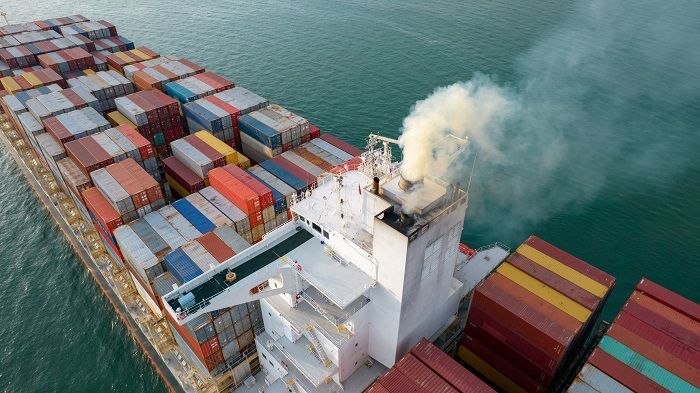
Ship-based carbon capture (SBCC) is one of the most-high impact trends in the maritime industry for 2024, with the greatest potential to help decarbonize the sector as it can capture up to 90% of carbon dioxide emissions from a ship, according to a report by the world’s biggest reinsurance company, Munich RE.
About SBCC
SBCC captures the carbon in a ship’s fuel before it is emitted into the atmosphere through the exhaust, and the process falls under the greater umbrella of CCUS, which is the process of capturing, utilizing and storing carbon dioxide that is intended to help protect the climate.
The Intergovernmental Panel on Climate Change (IPCC) has said CCUS will be essential to achieve the world’s net-zero targets and a McKinsey report estimates that annual investments in CCUS could hit $175 billion by 2035, due to the market’s support for it as a key tool for decarbonization.
SBCC is dependent upon modifications being made to ships including on-board CO2 storage and a value chain for the permanent storage of CO2 away from the atmosphere.
Challenges and Opportunities
Munich RE highlights that, as with the roll-out of any new technology, there are challenges and opportunities for the market around SBCC.
Some of the greatest problems include: “The cost of implementing SBCC and the lack of financial incentives for shipping companies to invest in it, uncertainty and a lack of standards for CCUS technology in the maritime industry, the challenge of ensuring consistent global regulations and standards for CCUS technology […] the need for further collective agreement and ambition among stakeholders in the maritime industry, and potential environmental concerns with biotic CCUS methods.”
That being said, the reinsurance goliath explains that not only is SBCC critical, but it could even be an additional source of income for shipping companies. Some ways it could bolster company’s bottom line is if shipping companies sell their emissions reduction credits to other companies, and through transporting CO2 to/from carbon storage facilities.
While environmentalists are concerned about the potential impact undersea carbon storage facilities on aquatic ecosystems, Munich RE says they may actually serve as artificial habitats for marine species, further supporting biodiversity. This final point by Munich RE requires more scientific studies to be supported.
Source: tovima.com
Latest News

Airbnb Greece – Initial CoS Ruling Deems Tax Circular Unlawful
The case reached the Council of State following annulment applications filed by the Panhellenic Federation of Property Owners (POMIDA)

Mitsotakis Unveils €1 Billion Plan for Housing, Pensioners, Public investments
Greek Prime Minister Kyriakos Mitsotakis has announced a new set of economic support measures, worth 1 billion euros, aiming to provide financial relief to citizens.

Alter Ego Ventures Invests in Pioneering Gaming Company ‘Couch Heroes’
Alter Ego Ventures' participation in the share capital of Couch Heroes marks yet another investment by the Alter Ego Media Group in innovative companies with a focus on technology.

Corruption Still Plagues Greece’s Driving Tests
While traffic accidents continue to claim lives on Greek roads daily, irregularities and under-the-table dealings in the training and testing of new drivers remain disturbingly widespread

Pope Francis Died of Stroke and Heart Failure Vatican Confirms
As news of the official cause of death spread, tributes poured in from across the globe. The 1.4 billion-member Catholic Church is united in grief, remembering a pope who championed inclusion, justice, and compassion

Increase in Both Museum Visits, Revenues for 2024
As expected, the Acropolis was the top archeological site in the country, followed by Sounion, Mycenae, the ancient theater of Epidaurus, and Vergina in northern Greece

Where Greece’s Tourists Come From: A Look at 2025’s Top Visitor Markets
The United Kingdom continues to hold the top spot as the largest source of incoming tourism, with 5.6 million seats booked for Greece this summer — up 2.2% from last year. This accounts for 20% of all international air traffic to Greece

Pope Francis: A Pontiff Who Reshaped the Papacy and Sparked a Global Conversation
His first words from the balcony of St. Peter’s Basilica—“Brothers and sisters, good evening”—set the tone for a pontificate that would challenge norms, favor mercy over dogma, and bring the papacy closer to the people.

When Blue Skies was Unmasked as ND’s Political ‘Slush Fund’
The fact that so many top New Democracy (ND) party cadres were paid by the firm Blue Skies, owned by Thomas Varvitsiotis and Yiannis Olympios, without ever citing this publicly, raises very serious moral issues, regardless of the legality

Greek Women’s Water Polo Team Top in the World after 13-9 Win Over Hungary
The Greek team had previously defeated another tournament favorite, the Netherlands, to reach the final.











![Πλημμύρες: Σημειώθηκαν σε επίπεδα ρεκόρ στην Ευρώπη το 2024 [γράφημα]](https://www.ot.gr/wp-content/uploads/2025/04/FLOOD_HUNGRY-90x90.jpg)




![Ξενοδοχεία: Μεγάλο το ενδιαφέρον για επενδύσεις στην Ελλάδα – Η θέση της Αθήνας [γραφήματα]](https://www.ot.gr/wp-content/uploads/2025/03/Athens-hotels-90x90.jpg)
























 Αριθμός Πιστοποίησης
Αριθμός Πιστοποίησης